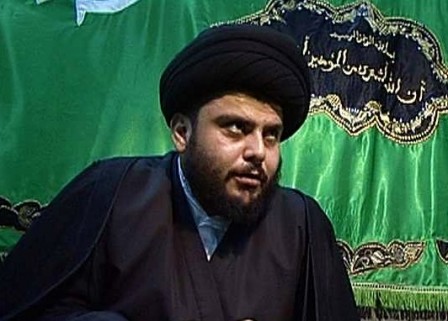Iraq: Al-Sadr Calls On Iraqis To “Resist The Occupiers”

NEWS JUNKIE POST
Jan 6, 2011 at 12:47 pmUPDATE: Friday, January 7 at 11:30 PM – US (PST)
Saturday in Najaf, cleric Al-Sadr called the United States, Israel and Britain “common enemies” and he is urging his followers to “resist the occupiers”. This was his first public speech since his return to Iraq. He delivered the speech in front of a cheering crowd of thousands Shia Muslims, and told them to “reject America”. Al-Sadr urged his supporters to “target only the occupiers, not Iraqis, with all means of resistance”.
Cleric Al-Sadr’s Return Will Consolidate Iran’s Influence On Iraq
The powerful cleric Moqtada Al-Sadr is back in Iraq after an absence of almost four years. Al-Sadr is expected to play a major political role in the country after his party became a critical part of a coalition government headed by Prime Minister Al-Maliki. Al-Sadr spent the last four year in Iran, and his return to Iraq is viewed by most analysts as a clear indication of the growing influence of the Islamic Republic in Iraq’s affairs. The return of the cleric could also re-start open sectarian conflicts between the Shia majority, in control of the government key cabinets, and the Sunni minority.
Even so Al-Sadr’s return was unannounced, hundreds of his followers took to the streets of Sadr City, a poor area of Northern Baghdad, to celebrate the cleric’s return. Al-Sadr supporters chanted “Imam Ali is with you”, in reference to the Shia Imam, and son-in-law of prophet Mohamed, whose legacy caused the split of Islam into its two branches of Sunni Muslims and Shia Muslims.
While in Iran, Al-Sadr was reportedly staying in the Holy city of Qom. In 2004, Sadr’s Mahdi Army led a major armed confrontation against US occupation forces in Sadr City. At the time, Al-Sadr was called the “most dangerous man in Iraq” by the US military, and an order was issued for his arrest. In 2008, Al-Sadr suspended the Mahdi Army military operations and fled to Iran.
The support from Al-Sadr was critical for Al-Maliki to break a nine months post election gridlock, and it gave Prime Minister Al-Maliki a chance to a second term in office. However, the relationship between the two men, who used to be enemies, is fragile at best and could be problematic down the line especially if Al-Maliki expect Al-Sadr to just play a minor supporting role. According to most analysts, the deal between Al-Sadr and Al-Maliki was brokered by Iran.
Al-Sadr’s movement won 42 seats in the parliamentary election in March 2010, from a 325-member parliament. Last month, members of Al-Sadr’s party were nominated to eight ministry positions in the new Iraqi coalition government headed by Al-Maliki. Al-Sadr has repeatedly asked for US troops to leave Iraq, and even so Al-Sadr’s return is critical for Al-Maliki to shore up his government, it will also consolidate Iran’s influence in Iraq.
The return, as a key power broker, of the so called “most dangerous man in Iraq” is yet another indication of the gross geopolitical miscalculation made by the United States when the decision was taken to invade Iraq. No only the Iraq war was started on false premises, but eight years later it is now clear that the toppling of Saddam Hussein is ultimately benefiting Iran.
Related Articles
- October 17, 2010 Middle East: The Clash Of The Fundamentalists
- June 30, 2012 Syria’s Civil War: Assad’s Fall Could Mean an Alawite Genocide
- December 23, 2011 Are Islamist Fundamentalists Hijacking The Arab Revolution?
- May 30, 2011 Iraq: 20,000 US Troops Likely To Stay As “Technical Experts”
- September 16, 2012 Muslim Rage: ‘Clash of Civilizations’ as Imperialism Key Narrative
- March 27, 2010 Iraqi Election: Allawi Narrowly Wins, Maliki Asks For Recount













6 Responses to Iraq: Al-Sadr Calls On Iraqis To “Resist The Occupiers”
You must be logged in to post a comment Login